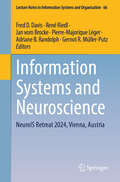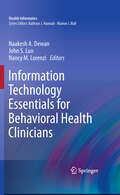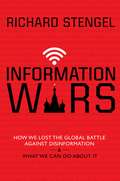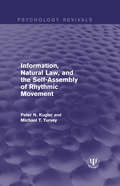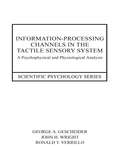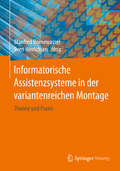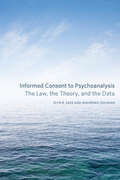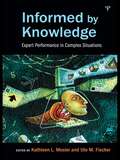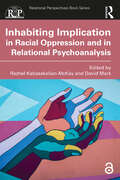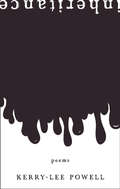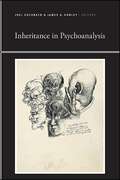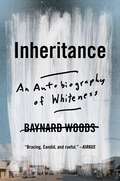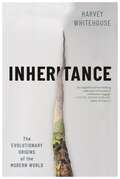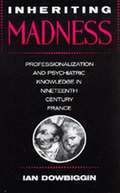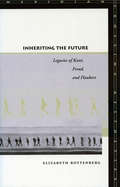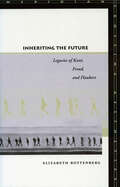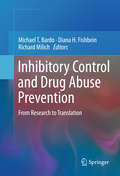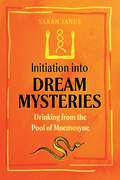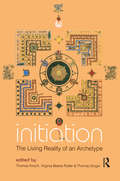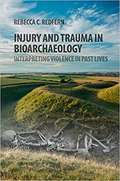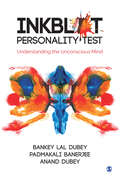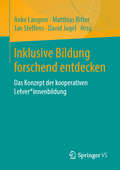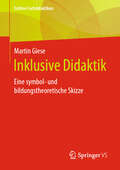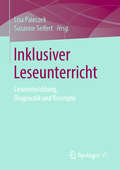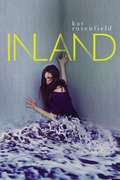- Table View
- List View
Information Systems and Neuroscience: NeuroIS Retreat 2024, Vienna, Austria (Lecture Notes in Information Systems and Organisation #66)
by Jan Vom Brocke René Riedl Pierre-Majorique Léger Fred D. Davis Adriane B. Randolph Gernot R. Müller-PutzThis book presents the proceedings of the NeuroIS Retreat 2024, June 9 - 11, Vienna, Austria, reporting on topics at the intersection of information systems (IS) research, neurophysiology and the brain sciences. Readers will discover the latest findings from top scholars in the field of NeuroIS, which offer detailed insights on the neurobiology underlying IS behavior, essential methods and tools and their applications for IS, as well as the application of neuroscience and neurophysiological theories to advance IS theory.
Information Technology Essentials for Behavioral Health Clinicians
by Nancy M. Lorenzi John Luo Naakesh DewanThe purpose of this book is to be the premier resource for behavioural health clinicians who are considering adopting technology into their practice. Written by experts and policy makers in the field this book will be recognized as the gold standard. Other books currently in this field are extremely technical and are geared primarily to policy makers, researchers and informaticians. While this book will be a useful adjunct to that audience, it is primarily designed for the over .5 million behavioural health clinicians in the U.S. and the millions others around the world. Adoption of technology is slow in behavioural healthcare, and this book will enhance the adoption and utilization of various technologies in practice. I.T. vendors may also purchase this book for their customers.
Information Wars: How We Lost the Global Battle Against Disinformation and What We Can Do About It
by Richard StengelFrom former Time editor and Under Secretary of State Richard Stengel, this is the first and only insider account of how the U.S. tried--and failed--to combat the global rise of disinformation that eventually spilled into the 2016 election. In February of 2013, Richard Stengel, the former editor of Time, joined the Obama administration as Under Secretary of State for Public Diplomacy and Public Affairs. Within days, two shocking events made worldwide headlines: ISIS executed American journalist James Foley in a graphic video seen by millions, and Vladimir Putin's "little green men"--Russian special forces--invaded Crimea, accompanied by a blizzard of Russian denials and false flags. What these events had in common besides their violent lawlessness is that they were the opening salvos in a new era of global information warfare, in which countries and non-state actors use social media and disinformation to create their own narratives and undermine anyone who opposes them. Stengel was thrust onto the front lines of this battle as he was tasked with responding to the relentless weaponizing of information by ISIS, Russia, China, and others. He saw the scale of what he was up against and found himself hopelessly outgunned. Then, in 2016, the wars Stengel was fighting abroad came home during the presidential election, as "fake news" became a rallying cry and the Russians used the techniques they learned in Ukraine to influence the election here. Rarely has an accomplished journalist been not only a close observer but also a principal participant in American foreign policy as events unfold, issues are debated, and decisions are made. Stengel takes you behind the scenes in the ritualized world of diplomacy, from the daily 8:30 morning huddle with a restless John Kerry to a midnight sit-down in Saudi Arabia with the prince of darkness, Mohammed bin Salman. The result is a compulsively readable account of how this new kind of warfare works and how difficult it is to fight. RICHARD STENGEL was the Under Secretary of State for Public Diplomacy and Public Affairs from 2013 to 2016. Before working at the State Department, he was the editor of Time for seven years, from 2006 to 2013. From 1992 to 1994, he collaborated with Nelson Mandela on the South African leader's autobiography Long Walk to Freedom. Stengel later wrote Mandela's Way, a New York Times bestseller, on his experience working with Mandela. He is the author of several other books, including January Sun, a book about life in a small South African town, as well as You're Too Kind: A Brief History of Flattery. He is an NBC/MSNBC analyst and lives in New York.
Information, Natural Law, and the Self-Assembly of Rhythmic Movement (Psychology Revivals)
by Michael T. Turvey Peter N. KuglerOriginally published in 1987, the introduction states: "the authors have successfully accomplished their program – to explain, based on physical representations, the observed relations among various parameters of wrist-pendulum oscillations. Thereby a set of new ideas and concepts, including those developed recently by the scientific school to which the authors belong, are introduced to biology. These concepts are closely related to the experimental data. This accomplishment makes the book especially attractive and demonstrates once more the productivity of applying physics to biology." "Clear language, simple figures, and physical examples illuminate rather complicated problems. These attractive features should make the book intelligible to a variety of investigators in the field of motor control, not only to the specialists with physical and mathematical education." From the foreword: " Kugler and Turvey have written strategic physical biology, and shown that, after all, dynamics (including both kinetics and kinematics) may support a unitary physical view of some of the profound operations of our brains… This is a grand start on what I hope is a larger program of demystifying behaviour."
Information-Processing Channels in the Tactile Sensory System: A Psychophysical and Physiological Analysis (Scientific Psychology Series)
by Ronald T. Verrillo George A. Gescheider John H. WrightInformation-Processing Channels in the Tactile Sensory System addresses the fundamental question of whether sensory channels, similar to those known to operate in vision and audition, also operate in the sense of touch. Based on the results of psychophysical and neurophysiological experimentation the authors make a powerful case that channels operate in the processing of mechanical stimulation of the highly sensitive glabrous skin of the hand. According to the multichannel model presented in this monograph, each channel, with its specific type of mechanoreceptor and afferent nerve fiber, responds optiimally to particular aspects of the tactile stimulus. It is further proposed that the tactile perception of objects results from the combined activity of the individual tactile channels. This work is important because it provides researchers and students in the field of sensory neuroscience with a comprehensive model that enhances our understanding of tactile perception.
Informatorische Assistenzsysteme in der variantenreichen Montage: Theorie und Praxis
by Manfred Bornewasser Sven HinrichsenIn diesem Buch werden die Herausforderungen bei der Einführung von informatorischen Assistenzsystemen in der Montage erörtert und umfangreiche Gestaltungsempfehlungen vermittelt.Die industrielle Montage ist in Deutschland nach wie vor von hoher volkswirtschaftlicher Bedeutung. In der Industrie existieren zehntausende Montagearbeitsplätze. Diese verändern sich. Infolge hoher Wettbewerbsintensität und Innovationsdynamik entstehen immer mehr Produktvarianten, die zu einer Zunahme der Komplexität der Montagearbeit beitragen. Es stellt sich daher die Frage, wie mit dieser gestiegenen Komplexität umzugehen und wie diese seitens der Beschäftigten zu bewältigen ist, ohne dass es zu Überbeanspruchungen und einem Verfehlen von Produktivitätszielen kommt. Während Montage bislang vornehmlich als energetische Arbeit begriffen wurde, rücken künftig die kognitiven Anteile der Montagearbeit in den Vordergrund. In diesem Zusammenhang kommt dem Komplexitäts- und Informationsmanagement eine entscheidende Rolle zu: Während früher Strategien des Vereinfachens, z. B. durch fortschreitende Arbeitsteilung, im Vordergrund standen, gewinnen heute Strategien des Beherrschens der Komplexität an Bedeutung. Im Zentrum dieses Paradigmenwechsels stehen informatorische Assistenzsysteme, die den Beschäftigten im Montageprozess mit Informationsangeboten unterstützen und so die wachsende Komplexität sicher beherrschbar machen.
Informed Consent to Psychoanalysis: The Law, the Theory, and the Data (Psychoanalytic Interventions)
by Elyn R. Saks Shahrokh GolshanThe goal of this book is to shed psychoanalytic light on a concept—informed consent—that has transformed the delivery of health care in the United States.Examining the concept of informed consent in the context of psychoanalysis, the book first summarizes the law and literature on this topic. Is informed consent required as a matter of positive law? Apart from statutes and cases, what do the professional organizations say about this?Second, the book looks at informed consent as a theoretical matter. It addresses such questions as: What would be the elements of a robust informed consent in psychoanalysis? Is informed consent even possible here? Can patients really understand, say, transference or regression before they experience them, and is it too late once they have? Is informed consent therapeutic or countertherapeutic? Can a “process view” of informed consent make sense here?Third, the book reviews data on the topic. A lengthy questionnaire answered by sixty-two analysts reveals their practices in this regard. Do they obtain a statement of informed consent from their patients? What do they disclose? Why do they disclose it? Do they think it is possible to obtain informed consent in psychoanalysis at all? Do they think the practice is therapeutic or countertherapeutic, and in what ways? Do they think there should or should not be an informed consent requirement for psychoanalysis?The book should appeal above all to therapists interested in the ethical dimensions of their practice.
Informed by Knowledge: Expert Performance in Complex Situations (Expertise: Research and Applications Series)
by Kathleen L. Mosier Ute M. FischerThe focus of this book is on how experts adapt to complexity, synthesize and interpret information in context, and transform or "fuse" disparate items of information into coherent knowledge. The chapters examine these processes across experts (e.g. global leaders, individuals in extreme environments, managers, police officers, pilots, commanders, doctors, inventors), across contexts (e.g. space and space analogs, corporate organizations, command and control, crisis and crowd management, air traffic control, the operating room, product development), and for both individual and team performance. Successful information integration is a key factor in the success of diverse endeavors, including team attempts to climb Mt. Everest, crowd control in the Middle East, and remote drilling operations. This volume is divided into four sections, each with a specific focus on an area of expert performance, resulting in a text that covers a wide range of useful information. These sections present well-researched discussions, such as: the management of complex situations in various fields and decision contexts; technological and training approaches to facilitate knowledge management by individual experts and expert teams; new or neglected perspectives in expert decision making; and the importance of ‘modeling’ expert performance through techniques and frameworks such as Cognitive Task Analysis, computational architectures based on the notion of causal belief mapping such as ‘Convince Me,’ or the data/frame model of sensemaking. The volume provides essential reading for researchers and practitioners of Naturalistic Decision Making and those who study Expertise; Organizational and Cognitive Psychologists; and researchers and students in Business and Engineering.
Inhabiting Implication in Racial Oppression and in Relational Psychoanalysis (Relational Perspectives Book Series)
by David Mark Rachel Kabasakalian-McKayWhat does it feel like to encounter ourselves and one another as implicated subjects, both in our everyday lives and in the context of our work as clinicians, and how does this matter? With contributions from a diverse group of relational psychoanalytic thinkers, this book reads Michael Rothberg’s concept of the implicated subject—the notion that we are continuously implicated in injustices even when not perpetrators—as calling us to elaborate what it feels like to inhabit such subjectivities in relation to others both similarly and differently situated. Implication and anti-Black racism are central to many chapters, with attention given to the unique vulnerability of racial minority immigrants, to Native American genocide, and to the implication of ordinary Israelis in the oppression of Palestinians. The book makes the case that the therapist’s ongoing openness to learning of our own implication in enactments is central to a relational sensibility and to a progressive psychoanalysis. As a contribution to the necessary and long-overdue conversation within the psychoanalytic field about racism, social injustice, and ways to move toward a just society, this book will be essential for all relational psychoanalysts and psychotherapists.
Inheritance
by Kerry-Lee Powell"Powerful ... full of dark nostalgia."-Nathan EnglanderThe LifeboatAll night in his lifeboat my father sangto keep the voices of the other menwho cried in the wreckage from reaching him,he sang what he knew of the requiem,of the hit parade and the bits of hymns,he sang until he would never sing again,scalding his raw throat with sea-wateruntil his ribs heaved, until the saltwept from his eyes on dry land,flecked at his lips in his squalling rages,streaked the sheets in his night sweatsas night after night the reassembled shipscattered its parts on the shore of his bed,and the lifeboat eased him out againto drown each night among singing men.Inspired by a shipwreck endured by her father during the Second World War, and by his struggle with post-traumatic stress disorder and eventual suicide, Inheritance is a powerful poetic debut by the winner of the 2013 Boston Review Fiction Contest and The Malahat Review Far Horizons Award.
Inheritance in Psychoanalysis (SUNY series, Insinuations: Philosophy, Psychoanalysis, Literature)
by Joel Goldbach; James A. GodleyIn contrast to the way inheritance is understood in scientific discourse and culture more broadly, inheritance in psychoanalysis is a paradox. Although it's impossible, strictly speaking, for the unconscious to be inherited, this volume demonstrates how the concept of inheritance can occasion a rich reassessment and reinvention of psychoanalytic theory and practice. The collection enacts a critical traversal of inheritance for psychoanalysis: from the most basic assumptions of natural or biological inheritance, such as innateness, heredity, evolution, and ontogenesis, to analysis of the ways cultural traditions can be challenged and transformed, and finally to the reinvention of psychoanalytic practice, in which the ethics of inheritance is fully realized as the individual's responsibility to transform the social bond. Featuring strong interdisciplinary analysis rooted in both psychoanalysis and philosophy, this volume further engages science, politics, and cultural studies, and addresses contemporary political challenges such as autism and transgenderism.
Inheritance: An Autobiography of Whiteness
by Baynard WoodsIn this unflinching, honest narrative, an award-winning journalist discovers his family&’s heritage as slave owners in the South and grapples openly with his whiteness to inspire others to do the same. "Bracing, candid, and rueful." —Kirkus Baynard Woods thought he had escaped the backwards ways of the South Carolina he grew up in, a world defined by country music, NASCAR, and the confederacy. But when a white guy from his hometown of Columbia, S.C.—also the birthplace of secession— massacred nine Black people in Charleston in the name of Southern whiteness, Woods began to delve into his family&’s history—and the ways that history has affected his own life. Upon discovering that his family—both the Baynards and the Woodses—collectively claimed ownership of more than 700 people in 1860 and that his great-grandfather had assassinated a Black politician in 1871, Woods realized his own name was a confederate monument. With assiduous research and brutal self-analysis, Woods uncovers the details of his family&’s crimes and all of the mundane ways he inherited them…and their coverup. Along with his name, he had inherited privilege, wealth, and all the lies that his ancestors passed down through the generations. At a time where Southern states are embracing a return to authoritarian, anti-democratic principles, Woods' analysis of how we inherited our whiteness from the twisted psychology of Southern slavers is both trenchant and urgent—but always cast against the foibles and failures of his own life. Unflinching and uninhibited, Inheritance is a no-holds-barred memoir that exposes the story from Trump country that you haven&’t heard while excavating what it means to reckon with whiteness in America today and what it might mean to begin to repair the past.
Inheritance: The Evolutionary Origins of the Modern World
by Harvey Whitehouse“An insightful and breathtaking exploration of humanity’s evolutionary baggage that explains some of our species’ greatest successes and failures.” —Yuval Noah Harari, author of SapiensThe ancient inheritance that made us who we are—and is now driving us to ruin.Each of us is endowed with an inheritance—a set of evolved biases and cultural tools that shape every facet of our behavior. For countless generations, this inheritance has taken us to ever greater heights: driving the rise of more sophisticated technologies, more organized religions, more expansive empires. But now, for the first time, it’s failing us. We find ourselves hurtling toward a future of unprecedented political polarization, deadlier war, and irreparable environmental destruction.In Inheritance, renowned anthropologist Harvey Whitehouse offers a sweeping account of how our biases have shaped humanity’s past and imperil its future. He argues that three biases—conformism, religiosity, and tribalism—drive human behavior everywhere. Forged by natural selection and harnessed by thousands of years of cultural evolution, these biases catalyzed the greatest transformations in human history, from the birth of agriculture and the arrival of the first kings to the rise and fall of human sacrifice and the creation of multiethnic empires. Taking us deep into modern-day tribes, including terrorist cells and predatory ad agencies, Whitehouse shows how, as we lose the cultural scaffolding that allowed us to manage our biases, the world we’ve built is spiraling out of control.By uncovering how human nature has shaped our collective history, Inheritance unveils a surprising new path to solving our most urgent modern problems. The result is a powerful reappraisal of the human journey, one that transforms our understanding of who we are, and who we could be.
Inheriting Madness: Professionalization and Psychiatric Knowledge in Nineteenth Century France
by Ian Robert DowbigginHistorically, one of the recurring arguments in psychiatry has been that heredity is the root cause of mental illness. In Inheriting Madness, Ian Dowbiggin traces the rise in popularity of hereditarianism in France during the second half of the nineteenth century to illuminate the nature and evolution of psychiatry during this period. In Dowbiggin's mind, this fondness for hereditarianism stemmed from the need to reconcile two counteracting factors. On the one hand, psychiatrists were attempting to expand their power and privileges by excluding other groups from the treatment of the mentally ill. On the other hand, medicine's failure to effectively diagnose, cure, and understand the causes of madness made it extremely difficult for psychiatrists to justify such an expansion. These two factors, Dowbiggin argues, shaped the way psychiatrists thought about insanity, encouraging them to adopt hereditarian ideas, such as the degeneracy theory, to explain why psychiatry had failed to meet expectations. Hereditarian theories, in turn, provided evidence of the need for psychiatrists to assume more authority, resources, and cultural influence. Inheriting Madness is a forceful reminder that psychiatric notions are deeply rooted in the social, political, and cultural history of the profession itself. At a time when genetic interpretations of mental disease are again in vogue, Dowbiggin demonstrates that these views are far from unprecedented, and that in fact they share remarkable similarities with earlier theories. A familiarity with the history of the psychiatric profession compels the author to ask whether or not public faith in it is warranted.
Inheriting the Future
by Elizabeth RottenbergThis book explores several canonical works of philosophy, psychoanalysis, and literature. The surprising juxtaposition of Kant's moral philosophy, Freud's reflections on obsessional neurosis, and Flaubert's peculiar late novel Bouvard et Pécuchet forms the basis of a compelling argument linking each of these central works around the problem of moral thought as it fundamentally determines the modern subject in relation to time. The book engages an area of emerging importance in contemporary critical thought, the problem of ethics or "otherness" as a crucial factor at play in speculative and literary works. The readings in this book provide insight into the ways in which three fundamental philosophical, psychoanalytic, and literary texts can be reread in light of their confrontation with a seemingly inhuman force at the heart of the foundation of the human subject.
Inheriting the Future: Legacies of Kant, Freud, and Flaubert
by Elizabeth RottenbergThis book explores several canonical works of philosophy, psychoanalysis, and literature. The surprising juxtaposition of Kant's moral philosophy, Freud's reflections on obsessional neurosis, and Flaubert's peculiar late novel Bouvard et Pécuchet forms the basis of a compelling argument linking each of these central works around the problem of moral thought as it fundamentally determines the modern subject in relation to time. The book engages an area of emerging importance in contemporary critical thought, the problem of ethics or "otherness" as a crucial factor at play in speculative and literary works. The readings in this book provide insight into the ways in which three fundamental philosophical, psychoanalytic, and literary texts can be reread in light of their confrontation with a seemingly inhuman force at the heart of the foundation of the human subject.
Inhibitory Control and Drug Abuse Prevention
by Richard Milich Michael T. Bardo Diana H. FishbeinThe purpose of this book is to review our state of knowledge about the neurobehavioral and psychosocial processes involved in behavioral inhibitory processes and to provide an insight into how these basic research findings may be translated into the practice of drug abuse prevention interventions. Over the last decade, there has been a wealth of information indicating that substance use disorders do not simply reflect an exaggeration of reward seeking behavior, but that they also represent a dysfunction of behavioral inhibitory processes that are critical in exercising self-control. A number of studies have determined that individuals with substance use disorders have poor inhibitory control compared to non-abusing individuals. In addition, the fact that the adolescent period is often characterized by a lack of inhibitory control may be one important reason for the heightened vulnerability for the initiation of drug use during this time. Controlled experiments utilizing neuroscience techniques in laboratory animals or neuroimaging techniques in humans have revealed that individual differences in prefrontal cortical regions may underlie, at least in part, these differences in inhibitory control. Although a few excellent journal reviews have been published on the role of inhibitory deficits in drug abuse, there has been relatively little attention paid to the potential applications of this work for drug abuse prevention. The current book will provide both basic and applied researchers with an overview of this important health-relevant topic. Since translational research cuts across multiple disciplines and most readers are not familiar with all of these disciplines, the reading level will be geared to be accessible to graduate students, as well as to faculty and researchers in the field. The book will be organized around three general themes, encased within introductory and concluding chapters. The first theme will review basic neurobehavioral research findings on inhibition and drug abuse. Chapters in this theme will emphasize laboratory studies using human volunteers or laboratory animals that document the latest research implicating a relation between inhibition and drug abuse at both the neural and behavioral levels of analysis. The second theme will move the topic to at-risk populations that have impulse control problems, including children, adolescents and young adults. The third theme will concentrate on prevention science as it relates to inhibitory control. Chapters in this theme will be written by experts attempting to develop and improve prevention interventions by integrating evidence-based knowledge about inhibitory control processes. In all of the chapters, writers will be asked to speculate about innovative approaches that may be useful for the practice of prevention.
Initiation into Dream Mysteries: Drinking from the Pool of Mnemosyne
by Sarah Janes• Presents effective exercises and techniques, inspired by ancient texts, to deepen your personal awareness of the dream state and experiment with dreams for healing and divinatory purposes• Each initiatory chapter includes a psychodramatic narrative designed to generate the perfect dream for each stage in the initiation• Explains how dreaming has influenced cultural, religious, and spiritual thinking• Includes access to a seven-part hypnagogic guided journey recordingInvoking Mnemosyne—Greek goddess of memory and eloquence, daughter of Heaven and Earth, mother of the Muses, and archetypal deity of the Asklepion dream temple tradition—this book initiates you into full dream consciousness, offering a lucid-dreaming ritual experience in the spirit of the Mystery Schools of antiquity.Sharing her more than a decade of research on Sleep Temples and Mystery Schools of the Esoteric Tradition, lucid-dreaming instructor Sarah Janes explores the evolution of imagination, memory, and consciousness throughout the ages and proposes that dreams have been fundamental in the creation and development of culture. Dreams play an important role in ancestor worship, afterlife beliefs, animism, religion, and wisdom traditions. Explaining how a conscious dream life is essential for self-discovery, deep integration, and healing, Sarah presents exercises, techniques, initiations, and seven guided audio meditations to help you explore the inner depths of your psyche. Sarah reveals how dreams offer us an opportunity to remember and directly experience our divinity, to transcend the limitations of our mortality and enter timeless imaginal realms. These realms, accessible through dreams, can help you to form a better understanding of who you are.Employing the power of story to affect the mind and lay down new neural pathways—as if one were really living the story—Sarah connects each initiatory chapter with a psychodramatic narrative as well as a guided audio meditation. Using symbolism and powerful imagery, these stories, combined with her meditations, help you generate the perfect dreams for each stage in the initiation. And by becoming a better dreamer, you can make better, more aware decisions in your waking life.
Initiation: The Living Reality of an Archetype
by Virginia Beane Rutter Thomas Singer Thomas KirschThis book builds on the vast clinical experience of Joseph L. Henderson, who became interested in initiatory symbolism when he began his analysis with Jung in 1929. Henderson studied this symbolism in patients' dreams, fantasies, and active imagination, and demonstrated the archetype of initiation in both men and women's psychology. After Henderson’s book was republished in 2005 Kirsch, Beane Rutter and Singer brought together this collection of essays to allow a new generation to explore the archetype of initiation. Initiation: The Living Reality of an Archetype demonstrates how the archetype of initiation is seen clinically today. Divided into distinct parts, the book explores the archetype of initiation in Dr Henderson’s own life, as well as suggesting its importance in: clinical practice culture aging and death. The chapters in this book amplify and extend the archetype of initiation from the earliest historical periods up to the present day. The editors argue that initiation symbolism often underlies contemporary phenomena, but is rarely recognized; Initiation helps to bring a new understanding to these experiences. This book will be of interest to psychotherapists with an interest in psychoanalysis and analytical psychology, as well as those training at analytic institutes.
Injury and Trauma in Bioarchaeology
by Rebecca C. RedfernThe remains of past people are a testament to their lived experiences and of the environment in which they lived. Synthesising the latest research, this book critically examines the sources of evidence used to understand and interpret violence in bioarchaeology, exploring the significant light such evidence can shed on past hierarchies, gender roles and life courses. The text draws on a diverse range of social and clinical science research to investigate violence and trauma in the archaeological record, focussing on human remains. It examines injury patterns in different groups as well as the biological, psychological and cultural factors that make us behave violently, how our living environment influences injury and violence, the models used to identify and interpret violence in the past, and how violence is used as a social tool. Drawing on a range of case studies, Redfern explores new research directions that will contribute to nuanced interpretations of past lives.
Inkblot Personality Test: Understanding the Unconscious Mind
by Bankey Lal Dubey Dr Padmakali Banerjee Anand DubeyFirst authoritative and comprehensive study in the field of Inkblot Personality Test, this book describes the historical roots of the three major projective inkblot measures: the Rorschach, the Holtzman Inkblot Technique (HIT) and the Somatic Inkblot Series (SIS). It presents the extensive psychometric background work accompanying the normative data and diagnostic indicators along with indices for selecting executives in a business organization. The book begins with a detailed history of Hermann Rorschach and his early experiments with inkblots in the diagnosis of mentally ill patients. Special attention is given to the administration and scoring of the Rorschach, with the sections detailing the systems developed by Klopfer and Exner. The HIT and SIS are also reviewed in detail, emphasizing their psychometric qualities.
Inklusive Bildung forschend entdecken: Das Konzept der kooperativen Lehrer*innenbildung
by Anke Langner Matthias Ritter Jan Steffens David JugelDer Band beschreibt das Konzept der kooperativen Lehrer*innenbildung und zeigt die forschungsorientierte Entwicklung, Begleitung und Umsetzung inklusiven Unterrichts an Schulen. Dafür werden lern- und entwicklungspsychologische Grundlagen, didaktische und diagnostische Fragen, sowie die methodische und forschende Realisierung inklusiven Unterrichts vorgestellt und die zunehmende Kooperation zwischen Forschung, Lehre und Schule, als Möglichkeit zur Entwicklung einer inklusiven Bildung konzipiert.
Inklusive Didaktik: Eine symbol- und bildungstheoretische Skizze (Edition Fachdidaktiken)
by Martin GieseMit diesem Buch legt der Autor den Entwurf einer symboltheoretischen und erfahrungsorientierten Fundierung des Inklusionsdiskurses sensu Cassirer vor. Vor dem Hintergrund der Annahme, dass sich der Inklusionsdiskurs sowohl in der Behindertenpädagogik als auch in der allgemeinen Erziehungswissenschaft durch ein explizites Theoriedefizit auszeichnet, verfolgt dieser Band das Ziel, eine inklusive schulische Didaktik besser als bisher theoretisch zu legitimieren.Der InhaltEinleitung • Zum Forschungsstand im Inklusionsdiskurs • Semiotische und bildungstheoretische Überlegungen – Eine kulturanthropologische Skizze • Didaktische Perspektiven • FazitDer AutorPD Dr. Martin Giese ist an der Deutschen Blindenstudienanstalt e.V. in Marburg sowie als Privatdozent am Institut für Rehabilitationswissenschaften der Humboldt-Universität zu Berlin tätig.
Inklusiver Leseunterricht: Leseentwicklung, Diagnostik und Konzepte
by Lisa Paleczek Susanne SeifertNeben entwicklungstheoretischen Aspekten zeigt das Buch Gelingensfaktoren effektiven Leseunterrichts in inklusiven Settings auf und stellt konkrete Umsetzungsvorschläge vor. Wiederholt wird betont, dass dabei die Diversität der Voraussetzungen, die die Kinder mitbringen, stets wertschätzend Berücksichtigung finden soll. Der Inhalt Entwicklung der Lese(teil-)fähigkeiten • Zusammenhänge der Lesefähigkeiten mit anderen Fähigkeiten• Österreichischer RahmenLesePlan • Transitionsprozesse • Diagnostik von Lesefähigkeiten und anderen leserelevanten Fähigkeiten • Response to Intervention • Inklusiver Schriftspracherwerb • Fortbildungsreihe Didaktische Pakete • Fachintegriertes Leseflüssigkeitstraining Filius • Kooperative Lernmethoden • Digitalisierung im Leseunterricht • Leseförderprogramm LARS Die Herausgeberinnen Mag.a Mestre Lisa Paleczek, PhD arbeitet im Bereich Inklusion an der Kirchlichen Pädagogischen Hochschule Graz und ist Lektorin im Bereich Integrationspädagogik und Heilpädagogische Psychologie an der Karl-Franzens-Universität Graz. Lehr- und Forschungsschwerpunkte: inklusive Unterrichtsgestaltung, Erstellung differenzierter Lesematerialien für die Primarstufe, Diagnostik, Sprach- und Leseentwicklung bei Kindern mit anderen Erstsprachen. Dipl.-Patholing.in Susanne Seifert, PhD arbeitet im Bereich Integrationspädagogik und Heilpädagogische Psychologie an der Karl-Franzens-Universität Graz. Lehr- und Forschungsschwerpunkte: Leseintervention, Diagnostik von Lese- und Sprachfähigkeiten, differenzierte Lesemethoden, Lesen bei Kindern mit anderen Erstsprachen.
Inland
by Kat RosenfieldThe psychological labyrinth of a young woman's insidious connection to the sea, from the Edgar Award nominated author of Amelia Anne is Dead and Gone. Callie Morgan has long lived choked by the failure of her own lungs, the result of an elusive pulmonary illness that has plagued her since childhood. A childhood marked early by the drowning death of her mother--a death to which Callie was the sole witness. Her father has moved them inland, away from the memories of the California coast her mother loved so much and toward promises of recovery--and the escape of denial--in arid, landlocked air. But after years of running away, the promise of a life-changing job for her father brings Callie and him back to the coast, to Florida, where Callie's symptoms miraculously disappear. For once, life seems delightfully normal. But the ocean's edge offers more than healing air ... it holds a magnetic pull, drawing Callie closer and closer to the chilly, watery embrace that claimed her mother. Returned to the ocean, Callie comes of age and comes into a family destiny that holds generations of secrets and very few happy endings.
